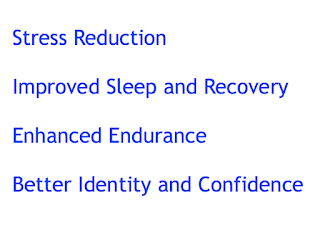But far fewer advance ourselves with mind training for both mental and physical physiologic benefits. What benefits accrue?
Reduced perceived work stress and self-reported improved sleep
Improved attention. Study compares students receiving mindfulness training or nutrition education
Improved brain structure in the anterior cingulate cortex (brain) involving self-regulation
Mild reduction in both systolic and diastolic blood pressure
Modest metabolic improvements in weight, blood sugar, and lipids
Improved immunity with enhanced antibody response to flu shots and fewer circulating inflammatory chemicals (cytokines).
Reduced stress hormone levels (cortisol) in medical students...
Mild reduction in anxiety, depression, and blood pressure in heart disease patients
Improved attention and reading in patients with dyslexia and attention deficits
Miscellaneous: improved performance on (GRE) testing via better memory and reading comprehension.
But we're young athletes...what's in it for us?
Headspace lists 4 reasons (with references) why athletes should practice mindfulness:
Coaches and athletes search for sustained competitive advantage. Why would we ignore established mind-body relationships?
The Huffington Post shares 10 Reasons Why Every Athlete in the World Should Meditate. Mindfulness helps athletes to fuller engagement, focus, coping, emotional stability, rest, and recovery.
"But I don't know how" or "I don't have time" or "I need guidance." Here is a link to some FREE guided meditations from UCLA.
You wouldn't seek to be a champion without training your body. Are you willing to surrender because of less than a championship mind?

